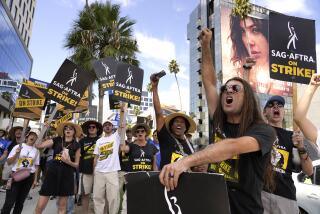Turning Jobless Into Capitalists
- Share via
Congress may soon give a tad of help to America’s jobless, who have been treated shabbily since former President Reagan began making it more difficult for them to get unemployment benefits.
And two states are experimenting with an innovative idea that might get some workers out of the ranks of the unemployed by helping them become small--very small--capitalists.
Most state governments, taking a cue from the Administration in Washington, have kept benefits low and made it harder for the unemployed to qualify for benefits or continue receiving them after their basic 26 weeks are exhausted.
So the experiment is worth trying, and even a little assistance from Congress for those without jobs will be welcome.
But remember, neither the interesting experiment nor the action being considered by Congress will have a significant impact on the fundamental problems: the lack of jobs and inadequate jobless benefits.
When our unemployment insurance system was created in 1935, it was to help tide the jobless over until they found work. For a time, benefits amounted to half or more of the average workers’ pay, and it wasn’t hard for them to qualify.
But now benefits average only 38% of the average weekly paycheck of $149, and only a third of the unemployed get any at all because of increasingly tight eligibility rules.
The experiment to help jobless workers start a business was first authorized for three states by Congress in 1987. But the lawmakers, through carelessness or ridiculous frugality, didn’t appropriate any money for it.
Fortunately, Massachusetts is finally going ahead with the experiment--without the feds--starting April 1.
Congress said three states could waive the requirement that workers must be actively seeking jobs to get benefits. That waiver enables a worker to get unemployment benefits for 26 weeks while learning how to create a business and then start.
Oregon and Minnesota were offered the chance to try the experiment but decided that they could not afford it without federal financial help.
But Bonnie Dallinger, director of Massachusetts’ “Enterprise Project,” says: “We are as broke as anyone else, but we think it’s worth a try” without federal assistance.
The idea of trying to make small-business- men and -women out of unemployed workers sounds like something one might expect from free-market enthusiasts such as Reagan and the conservative British Prime Minister Margaret Thatcher, rather than from liberal Massachusetts officials.
In fact, the plan is being used in Britain where it is called the Enterprise Allowance Scheme, and the program manager, Simon Perryman, said last week that it is working very well. Since it began in 1983, nearly 500,000 jobless workers started their own small businesses, and some 67% of those businesses were still operating after three years, Perryman said.
A similar plan seems to be working fairly well in France, too, and both countries are models for us.
The idea did appeal to Reagan and, without Congressional action, the state of Washington was given special dispensation to start its little capitalist experiment in l984 with a special $2.7-million Department of Labor grant.
That pilot program showed progress and was expanded statewide last October. It offers a lump-sum payment to help start a business, in contrast with Massachusetts’ weekly benefits.
But the basic concept is the same in both states: try to create more small businesses that not only might offer work for one unemployed person, the owner, but also could provide work for others.
In Massachusetts, jobless workers with a state-approved business plan will continue to receive regular weekly benefits without having to spend time job hunting. They will get counseling, elementary business training and access to loans through a cooperating bank, Shawmut of Boston.
The main criticism of the concept comes from employers who fear that the money they pay to support the unemployment benefit system might finance a rival business. For example, a mechanic laid off from a garage might use jobless benefits to open up a competitive garage.
But those complaints so far are few. If it works here as well as the British claim it is working there, it could have a major effect on unemployment. Dallinger and others say the programs here would involve about 5% of the unemployed, or about 300,000 Americans.
The gains that can come from Congressional action under what is pretentiously titled the Unemployment Insurance Reform Act of 1990 are much more mundane and quite limited, but they would affect far more of the jobless.
The bill would increase money for administration of the unemployment system--no small task considering its size. Last year’s benefits totaled $13.7 billion.
It would require employers to add just $4 a year per worker to their cost of running the system and would represent a 7% increase in the administrative budget. It should make it function more efficiently, reducing the time jobless workers must stand in frustratingly long lines to apply for benefits and cutting the benefit processing time.
The bill will also make it easier for workers to get an additional 13 weeks of benefits if they are still without jobs after getting benefits for 26 weeks. And the measure provides that the federal government will pick up a larger share of the costs of those extra weeks of benefits.
However, the experiments and the expected action by Congress must not be used as an excuse for continuing to ignore the inadequacy of jobless benefits and the excessively rigid eligibility rules that make it so difficult for those who deserve benefits to get them.
More to Read
Inside the business of entertainment
The Wide Shot brings you news, analysis and insights on everything from streaming wars to production — and what it all means for the future.
You may occasionally receive promotional content from the Los Angeles Times.










